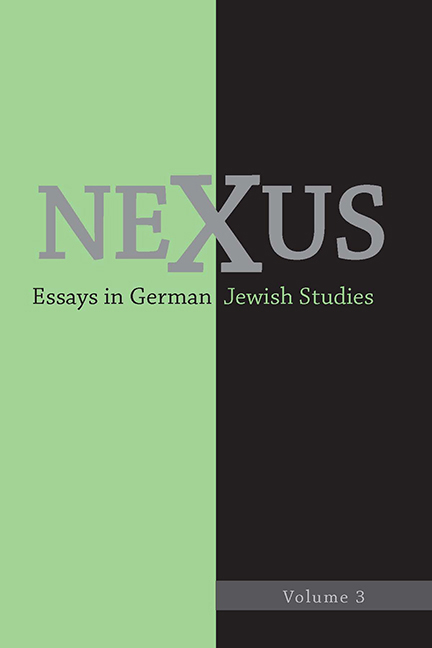Book contents
- Frontmatter
- Dedication
- Contents
- Acknowledgements
- Introduction
- “Ein weites Feld”: Ein Wort zu deutsch-jüdischen Studien anläβlich der Verleihung des ersten Egon Schwarz Prize for the Best Essay in German Jewish Studies
- “An Open Field”: A Word about German Jewish Studies on the Occasion of the Presentation of the first Egon Schwarz Prize for the Best Essay in German Jewish Studies
- Laudatio for Abigail Gillman's Prize-Winning Nexus Essay: “Martin Buber's Message to Postwar Germany”
- Heinrich Heine in Modern German History, by an Eyewitness
- Jeffrey Sammons, Heine, and Me: Some Autobiographical Reflections
- Heine's Disparate Legacies: A Response to Jeffrey Sammons
- My Debt to Heine and Sammons
- Die letzten Tage der Menschheit as a German-Jewish Tragicomedy, and the Challenge to Translators
- Edward Timms's “Die letzten Tage der Menschheit as a German-Jewish Tragicomedy and the Challenge to Translators”: A Response
- Kraus the Mouse? Kafka's Late Reading of Die Fackel and the Vagaries of Literary History
- The Parable of the Rings: Sigmund Freud Reads Lessing
- The Poetics of the Polis: Remarks on the Latency of the Literary in Hannah Arendt's Concept of Public Space
- The Marrano in Modernity: The Case of Karl Gutzkow
- German Jews Dogged by Destiny: Werewolves and Other Were-Canids in the Works of Heinrich Heine and Curt Siodmak
- Authenticity, Distance, and the East German Volksstück: Yiddish in Thomas Christoph Harlan's Ich Selbst und Kein Engel
The Poetics of the Polis: Remarks on the Latency of the Literary in Hannah Arendt's Concept of Public Space
Published online by Cambridge University Press: 11 May 2017
- Frontmatter
- Dedication
- Contents
- Acknowledgements
- Introduction
- “Ein weites Feld”: Ein Wort zu deutsch-jüdischen Studien anläβlich der Verleihung des ersten Egon Schwarz Prize for the Best Essay in German Jewish Studies
- “An Open Field”: A Word about German Jewish Studies on the Occasion of the Presentation of the first Egon Schwarz Prize for the Best Essay in German Jewish Studies
- Laudatio for Abigail Gillman's Prize-Winning Nexus Essay: “Martin Buber's Message to Postwar Germany”
- Heinrich Heine in Modern German History, by an Eyewitness
- Jeffrey Sammons, Heine, and Me: Some Autobiographical Reflections
- Heine's Disparate Legacies: A Response to Jeffrey Sammons
- My Debt to Heine and Sammons
- Die letzten Tage der Menschheit as a German-Jewish Tragicomedy, and the Challenge to Translators
- Edward Timms's “Die letzten Tage der Menschheit as a German-Jewish Tragicomedy and the Challenge to Translators”: A Response
- Kraus the Mouse? Kafka's Late Reading of Die Fackel and the Vagaries of Literary History
- The Parable of the Rings: Sigmund Freud Reads Lessing
- The Poetics of the Polis: Remarks on the Latency of the Literary in Hannah Arendt's Concept of Public Space
- The Marrano in Modernity: The Case of Karl Gutzkow
- German Jews Dogged by Destiny: Werewolves and Other Were-Canids in the Works of Heinrich Heine and Curt Siodmak
- Authenticity, Distance, and the East German Volksstück: Yiddish in Thomas Christoph Harlan's Ich Selbst und Kein Engel
Summary
In The Seeds of a Fascist International, Hannah Arendt analyzes one of the most widely distributed and most impactful documents in international anti-Semitism: The Protocols of the Elders of Zion . Her initial question— why people believed that the Protocols were real, even though they were obviously a forgery—goes to the heart of the strange fascination with this text. The present essay thus sets forth Arendt's explanation for the text's extensive impact and appeal in light of her concept of public space—that is to say, making thinking public. Additionally, Arendt's explanation demonstrates the attraction as well as the necessarily non-literary dimension of ideological texts like the Protocols.
IN JUNE 1945, HANNAH ARENDT published an article entitled The Seeds of a Fascist International in the New York journal Jewish Frontier. One year later, she sent the essay to Karl Jaspers, who at that time was working on the journal Die Wandlung, in which he occasionally published Arendt's articles. A German-language publication did not occur, however, because Jaspers was preparing his text “Kopfzerbrechen.” Jaspers did not fully share Arendt's convictions about the close connection between anti- Semitism and fascism in historical context. Arendt's essay analyzed one of the most widely distributed and most persistent documents in international anti-Semitism: The Protocols of the Elders of Zion. Now one might think that an analysis of this topic would have been perfectly placed in Germany at the time, just after twelve years of National Socialist rule had come to an end. Yet the strange history of the reception of the Protocols included the fact that they were not just distributed worldwide—and they still are—but rather that very prominent supporters also participated in their dissemination. In the USA, none other than Henry Ford published a modified “American” version text of the Protocols with extensive commentary. Translations of Ford's version appeared in France, Norway, Denmark, Poland, Bulgaria, Italy, Greece, and finally in Japan and China as well. This meant that Ford made a significant contribution to the distribution of the Protocols; seven years later, though, he officially distanced himself from the text in a legal dispute. In this context, the USA was certainly the right place to publish Arendt's article.
- Type
- Chapter
- Information
- Nexus 3Essays in German Jewish Studies, pp. 113 - 122Publisher: Boydell & BrewerPrint publication year: 2017



